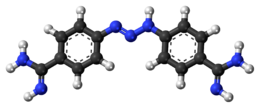Diminazene
 |
|
 |
|
| Clinical data | |
|---|---|
| Trade names | Azidin, Berenil, Ganasag, Pirocide |
| Routes of administration |
IM, SC |
| ATCvet code | |
| Legal status | |
| Legal status |
|
| Identifiers | |
|
|
| Synonyms | 4,4'-(1-Triazene-1,3-diyl)bis(benzenecarboximidamide) |
| CAS Number | |
| PubChem CID | |
| ChemSpider | |
| UNII | |
| ChEBI | |
| ChEMBL | |
| ECHA InfoCard | 100.007.860 |
| Chemical and physical data | |
| Formula | C14H15N7 |
| Molar mass | 281.316 g/mol |
| 3D model (Jmol) | |
|
|
|
|
Diminazene (INN; also known as diminazen) is an anti-infective medication for animals that is sold under a variety of brand names (see drugbox). It is effective against certain protozoa such as Babesia, Trypanosoma and Cytauxzoon. The drug may also be effective against certain bacteria including Brucella and .
Chemically it is a di-amidine, and it is used in form of the aceturate (N-acetylglycinate).
The mechanism is not well understood; it probably inhibits DNA replication, but also has affinity to RNA.
Acute side effects include vomiting, diarrhoea and hypotension (low blood pressure). Diminazen can harm the liver, kidneys and brain, which is potentially life-threatening; especially camels are susceptible to these effects.
...
Wikipedia
